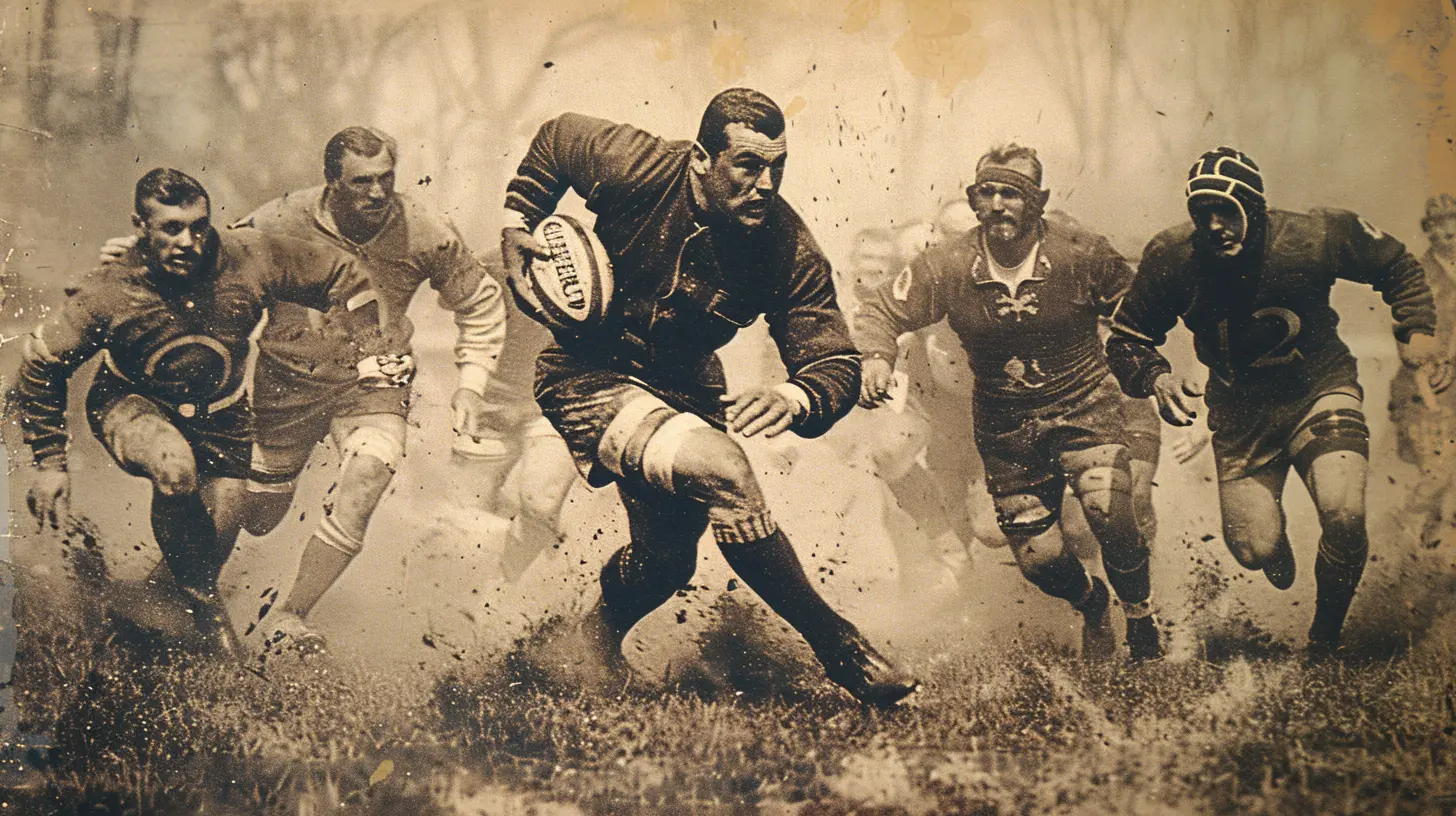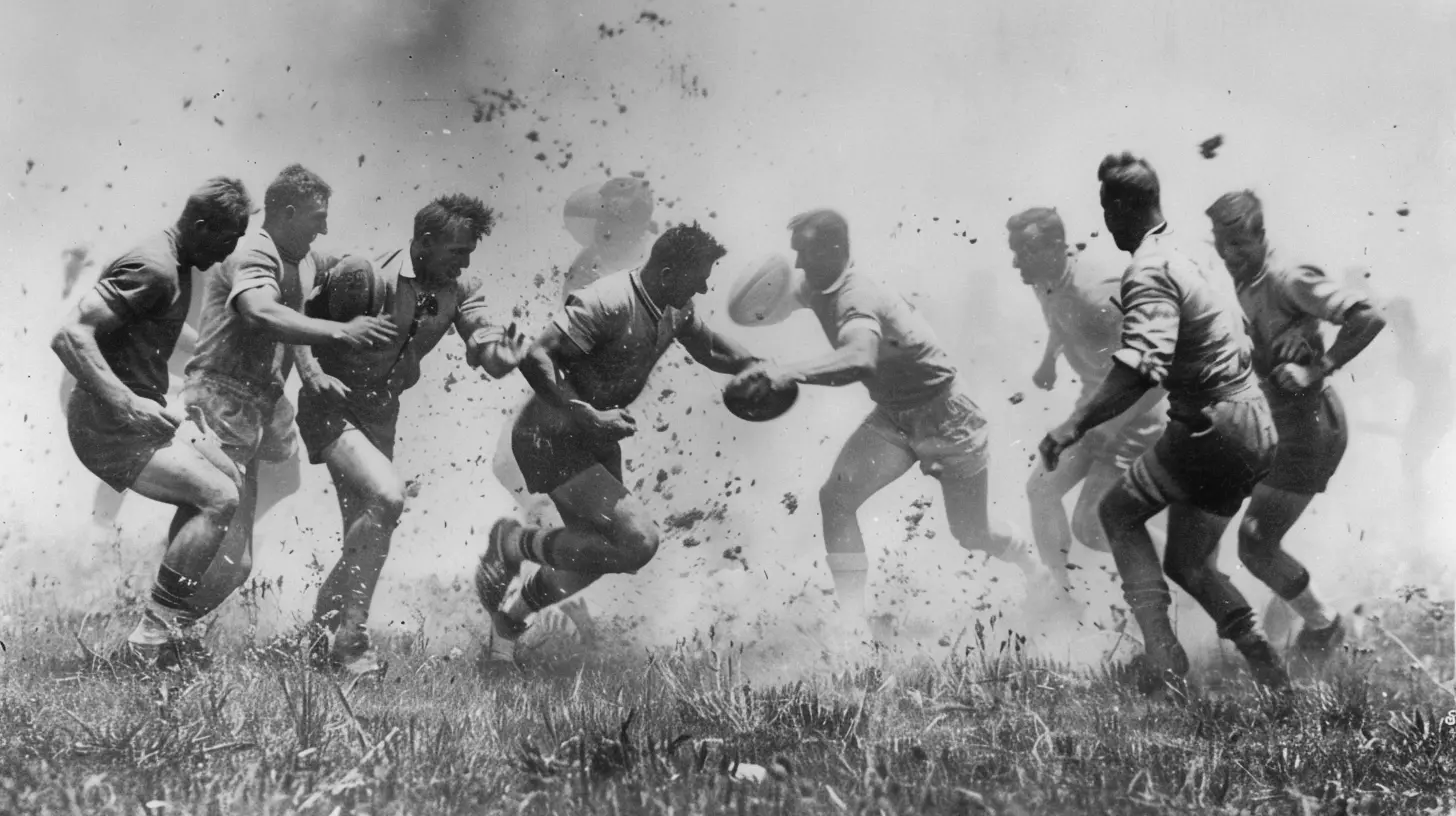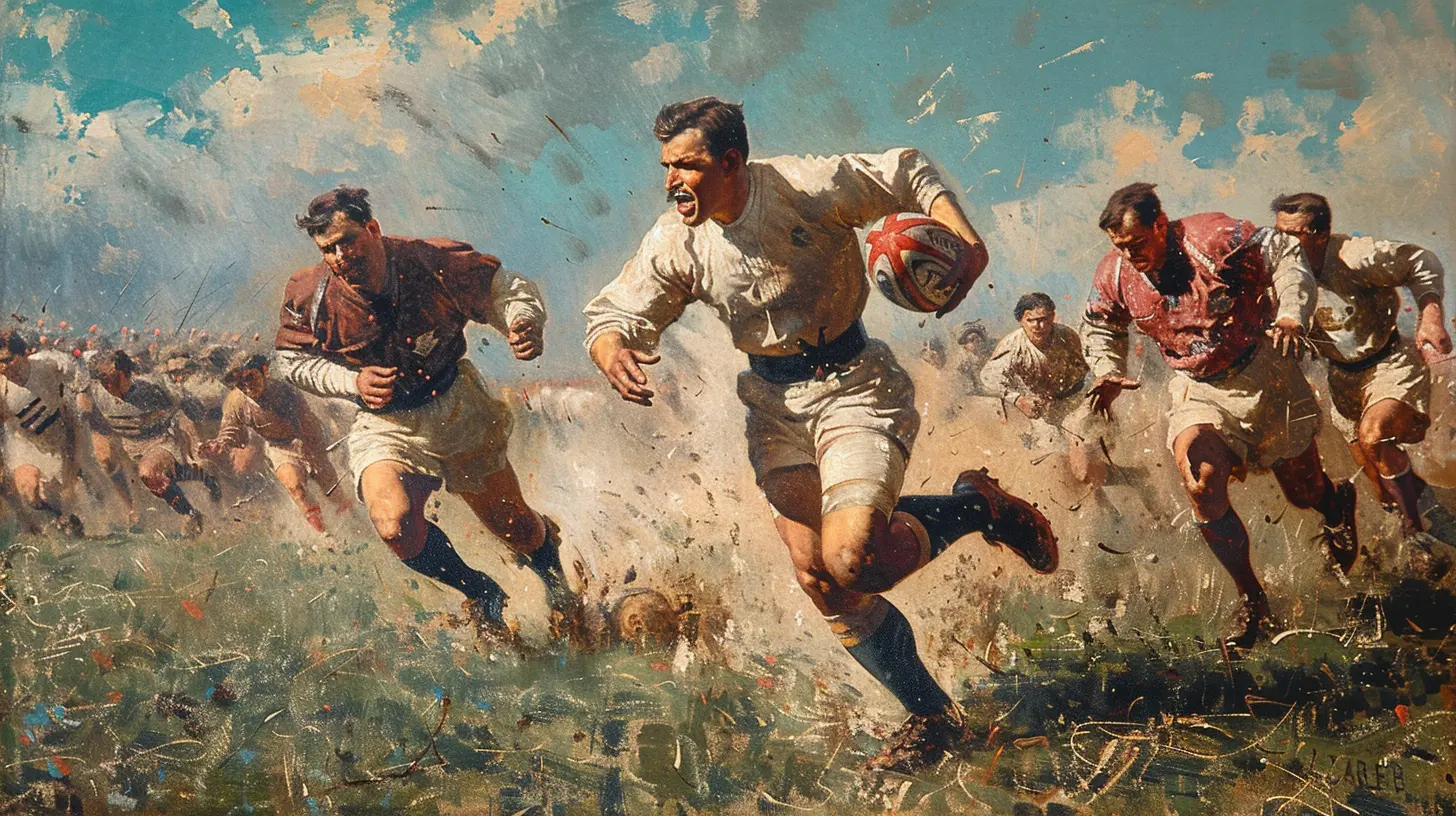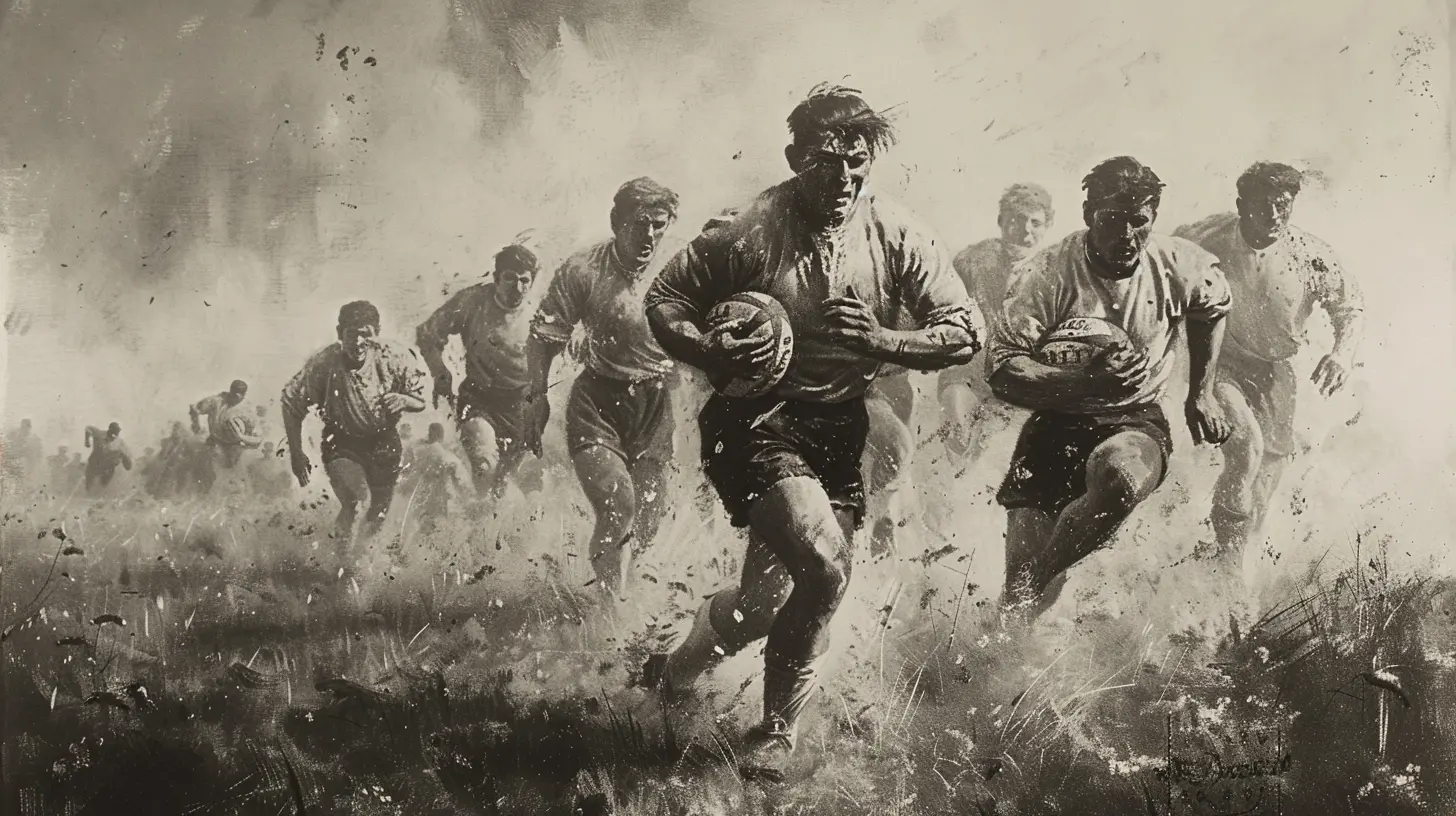1 April 2025
Rugby—it's brutal, it's thrilling, and it's a sport that demands heart, grit, and sheer determination. But where did it all begin? Legends tell us that this high-impact game was born out of rebellion, a single act of defiance that shifted the course of sports history.
From a schoolboy’s unorthodox decision to an internationally celebrated sport, rugby has a unique and fiery origin story. So, grab a cuppa, sit back, and let’s dive into the fascinating tale of how rugby came to be. 
The Famous Act of Defiance
Picture this: It's 1823 in the town of Rugby, England. The setting—a traditional English school, the Rugby School, where young lads are engaged in a game of football, or what many now refer to as soccer. The rules are strict: no hands allowed.Enter William Webb Ellis, a young student who, in a moment of sheer audacity, picks up the ball and runs with it. A simple act, but one that defied the norm and unwittingly planted the seed for what we now call rugby.
Now, historians argue whether Webb Ellis truly deserves the credit, with some suggesting that the game evolved more organically over time. But regardless of how it actually unfolded, this legendary moment became the cornerstone of rugby’s origin story. 
Early Development: From Chaos to Structure
The beauty of rugby—both then and now—lies in its raw energy. But back in the early days, the game was nothing short of an unruly scrap. There were no official rules, no referees, and barely any structure. It was messy, aggressive, and—let’s be honest—borderline dangerous.However, by the mid-19th century, rugby began taking shape. The Rugby School itself played a key role in refining the sport. By 1845, the first written rules were established, detailing aspects like tackling, passing, and scoring. This was the beginning of rugby as an organized sport.
But here's the kicker—rugby and soccer were still two sides of the same coin, sharing many similarities. That was until a crucial split occurred in 1863. 
The Great Divide: Rugby vs. Soccer
Rugby and football were initially intertwined, but there was a growing divide among players and clubs. Some preferred a game focused on kicking, while others enjoyed the rough-and-tumble nature of carrying the ball.In 1863, the Football Association (FA) was formed, formally establishing soccer as a separate sport. Rugby, however, went its own way. By 1871, the Rugby Football Union (RFU) was founded, ensuring rugby had its own governing body and official rules.
This was no small moment—rugby was now a fully recognized sport, distinct from soccer, and it was ready to take on the world. 
Rugby Spreads Across the Globe
Once rugby had its structure, it didn’t take long for it to spread beyond England. The sport made its way to Scotland, Ireland, and Wales, where it was embraced with open arms. By the late 19th century, rugby had crossed oceans, reaching Australia, New Zealand, South Africa, and beyond.The real game-changer? The British Empire. Wherever the British colonized, rugby followed. Soldiers, merchants, and settlers introduced the game to new lands, and it wasn’t long before different nations began putting their own spin on it.
New Zealand’s Māori players, South Africa’s fierce Springboks, and the raw power of the Pacific Island teams—rugby became more than just a British pastime. It transformed into a global phenomenon.
The Birth of Rugby League
By the late 1800s, rugby was thriving—but there was one glaring issue: class divisions. Rugby was largely an amateur sport, meaning players weren’t paid. This worked well for wealthy gentlemen who could afford to play for free, but what about the working-class players?In the north of England, where many players were miners, factory workers, and laborers, the demand for professionalism grew. They needed compensation for missing work to compete. In 1895, the tension reached a breaking point, leading to a split in the sport.
Northern clubs broke away and formed the Rugby League, introducing new rules and placing a heavier emphasis on speed and flair. Rugby League and Rugby Union became two distinct versions of the game, each with its own identity, followers, and style of play.
Rugby in the Modern Era
Fast forward to today, and rugby is a juggernaut on the world stage. With international tournaments like the Rugby World Cup, the Six Nations, and the Super Rugby competition, the sport continues to capture hearts worldwide.And let’s not forget the mighty haka—the spine-tingling war dance performed by the New Zealand All Blacks before their matches. It’s not just a performance; it’s a statement, a tradition that embodies the raw intensity and cultural richness of rugby.
Rugby’s evolution from a rebellious schoolboy gesture to a globally admired sport is nothing short of spectacular. It has survived wars, social changes, and even rival sports, proving time and time again that it’s here to stay.
Why Rugby Stands Out
What makes rugby so special? For one, it's a game built on respect. Unlike many other contact sports, rugby has a strong culture of sportsmanship. Players may bash into each other with bone-crunching tackles, but come full-time, they shake hands, share a drink, and acknowledge each other's efforts.Then there’s the inclusivity. Rugby is for everyone—big, small, fast, slow. Every position on the field demands a different skill set, meaning there's a place for all body types. It’s a game that rewards teamwork, strategy, and, above all, resilience.
And let’s not forget the camaraderie. Once you’re part of a rugby team, you’re part of a family. Whether at the professional level or on a local club team, the bonds forged in rugby run deep.
Conclusion: A Legacy of Defiance and Grit
The origins of rugby are steeped in defiance, passion, and an unbreakable spirit. What started as a schoolboy’s rebellious act evolved into one of the most respected sports in the world.From the muddy grounds of Rugby School to stadiums packed with thousands of roaring fans, rugby has come a long way. But at its core, it’s still the same fearless, high-intensity game that thrives on courage, teamwork, and sheer willpower.
So next time you watch a match or step onto the field, remember—you’re not just playing a sport. You’re carrying on a legacy that began with a simple act of defiance almost 200 years ago.


